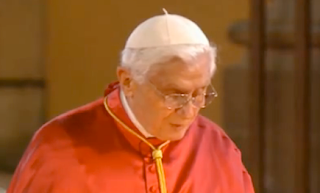The central question at issue, then, is this: where is the ethical foundation for political choices to be found? The Catholic tradition maintains that the objective norms governing right action are accessible to reason, prescinding from the content of revelation.
According to this understanding, the role of religion in political debate is not so much to supply these norms, as if they could not be known by non-believers – still less to propose concrete political solutions, which would lie altogether outside the competence of religion – but rather to help purify and shed light upon the application of reason to the discovery of objective moral principles.
Benedict's meaning hinges on the definition of the word "prescinding," a word that I had frankly never encountered before. At first glance, I assumed it meant "deriving," in which case Benedict would be saying that truth can be accessed by reason, IF the holy scriptures are taken as a necessary assumption and starting point.
But no. "Prescind" means "to leave aside from consideration." In other words, reason can arrive at truth without recourse to divine revelation. Does this mean religion is irrelevant or unnecessary? No. It simply means that the logic of God's creation is consistent, and that insight into the divine mind can be gained by studying the universe he chose to create.
Catholics can confidently assert that well-applied reason will never contradict divine revelation. In fact, reason can and is applied to help men interpret revelation. This is one of the points Benedict goes on to make.
However, when reason is faultily applied and the rational process is distorted, religion is necessary to correct it.
Here's what Benedict has to say:
This “corrective” role of religion vis-à-vis reason is not always welcomed, though, partly because distorted forms of religion, such as sectarianism and fundamentalism, can be seen to create serious social problems themselves. And in their turn, these distortions of religion arise when insufficient attention is given to the purifying and structuring role of reason within religion. It is a two-way process. Without the corrective supplied by religion, though, reason too can fall prey to distortions, as when it is manipulated by ideology, or applied in a partial way that fails to take full account of the dignity of the human person. Such misuse of reason, after all, was what gave rise to the slave trade in the first place and to many other social evils, not least the totalitarian ideologies of the twentieth century. This is why I would suggest that the world of reason and the world of faith – the world of secular rationality and the world of religious belief – need one another and should not be afraid to enter into a profound and ongoing dialogue, for the good of our civilization.
Religion, in other words, is not a problem for legislators to solve, but a vital contributor to the national conversation. In this light, I cannot but voice my concern at the increasing marginalization of religion, particularly of Christianity, that is taking place in some quarters, even in nations which place a great emphasis on tolerance. There are those who would advocate that the voice of religion be silenced, or at least relegated to the purely private sphere. There are those who argue that the public celebration of festivals such as Christmas should be discouraged, in the questionable belief that it might somehow offend those of other religions or none. And there are those who argue – paradoxically with the intention of eliminating discrimination – that Christians in public roles should be required at times to act against their conscience. These are worrying signs of a failure to appreciate not only the rights of believers to freedom of conscience and freedom of religion, but also the legitimate role of religion in the public square. I would invite all of you, therefore, within your respective spheres of influence, to seek ways of promoting and encouraging dialogue between faith and reason at every level of national life.
Again, I encourage everyone to read the whole thing. Brilliant stuff! And the recording is striking, simply because Benedict's hushed voice is in such stark contrast to the clarity of his message. Adds a different reading dimension!


No comments:
Post a Comment